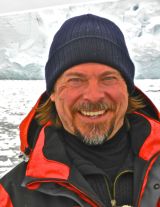Professor shares
ancestor's tale
Ruzesky's
great-grandfather's cousin was Roald Amundsen, the first explorer to
reach the South Pole
Julie Chadwick / Nanaimo Daily News
October 11, 2013
VIU professor Jay Ruzesky will speak
about his experiences in Antarctica and his famous ancestor Roald
Amundsen in a presentation at the university on Oct. 18
It was out on the bow of the Polar
Pioneer headed for Antarctica, that Jay Ruzesky got a peculiar
sensation.
The vast, inscrutable landscape was
stunning, said Ruzesky, and in its presence he struggled to
understand his accompanying emotions.
The closest he could come to describing
it was that he felt he was home.
Though it was a completely foreign
locale, Ruzesky may have been picking up on an ancestral affinity:
His great-grandfather's cousin was Roald Amundsen, famous for being
the first explorer to go to the South Pole.
"Lots of families have their claim
to fame, whatever that might be," said Ruzesky. "That was
kind of our family's fame story, was that we were related to Amundsen
the explorer."
On Oct. 18 Ruzesky will share the tale
of his ancestor, as part of VIU's Arts and Humanities colloquium
series.
In his presentation, Amundsen Then and
Now: The End of the Age of Heroic Exploration Ruzesky will look at
his own 100th anniversary expedition to Anarctica and analyze how
exploration has drastically changed in the last 100 years.
It was on Dec. 14, 1911 that Amundsen
arrived at the South Pole in a five-person, 16-dog expedition team.
Plunging a Norwegian flag into the
frozen ground, the acheivement was the culmination of years of
fundraising and planning.
Some of those funds were raised through
North American speaking tours, one of which had stopped in Claresholm
Alta., where Ruzesky's ancestors lived.
It was at that time that Ruzesky's
grandfather received a watch as a gift from Amundsen, a keepsake that
remains in his family today.
Amundsen was initially inspired by the
Arctic explorer Sir John Franklin.
"One of the things he said in his
autobiography was that he read about polar exploration when he was a
young man," said Ruzesky. "When he was 14 years old he read
Franklin's accounts of one of his expeditions in the North. .. it was
a horrible expedition and all of the men spent a couple of weeks
barely surviving to get back from where they'd been. They ended up
eating the leather from their shoes because they had no food. So it
was horrible suffering, but what he says in his autobiography is that
he read that and was attracted to it, and thought, 'Wow, I'd like to
go suffer for a cause too.'" Amundsen's experiences in turn
served to inspire Ruzesky.
"That idea of polar exploration,
of going to the ends of the earth to these stark, cold, lonely places
which was where he really spent his life - that reaches pretty deeply
into the imagination," he said. "I was told those stories
from pretty early on."
However, travelling to far-flung places
means a very different experience for the modern explorer, he added.
Ruzesky's own expedition to Antarctica
in December of 2011 - which he detailed in his memoir In Antarctica:
An Amundsen Pilgrimage - highlighted these changes.
"One goes in rather a different
way now. I was not as interested in suffering, as he seemed to be,"
he said.
"It's a very hostile and
challenging landscape. .. but it's also a place where modern clothing
and transportation can take a lot of the risk out of it and make it a
lot more comfortable."
In his talk Ruzesky details how he came
to terms with his own romantic notions of exploration - his visions
of frostbitten cheeks and dogs howling into the wind - to come away
with an appreciation for what remote places like the Antarctic can
offer to one's perspective.
Ruzesky's talk is free and will be held
in VIU's Malaspina Theatre from 10-11:30 a.m. on Oct. 18.
JChadwick@nanaimodailynews.com








